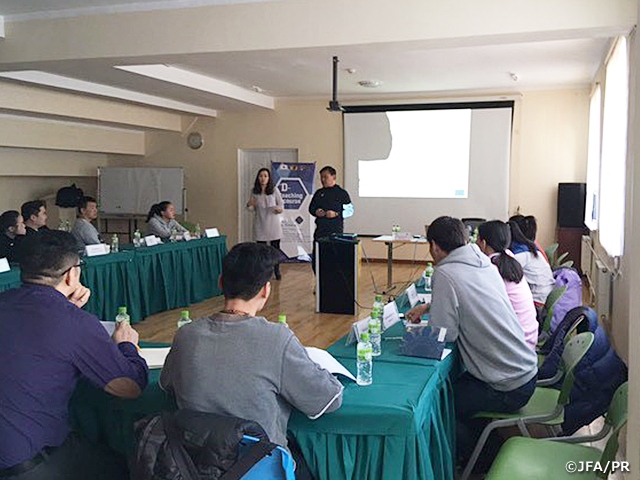NEWS
JFA Class D Coach Training Course held in Mongolia
27 March 2018

Under the joint sponsorship with the Japan Foundation, the Embassy of Japan in Mongolia and Mongolian Football Federation (MFF), Japan Football Association (JFA) held a JFA Class D Coach Training Course in Ulaanbaatar from Wednesday 21 March to Friday 23 March 2018 delivered by JFA Instructor, KIMURA Kokichi. A refresher course for coaching instructors of MFF was also held on the previous day.
Report
KIMURA Kokichi, JFA Instructor
As part of the Cultural Exchange Programme carried out by the Japan Foundation, JFA organised a JFA Class D Coach Training Course in Ulaanbaatar, Mongolia for two days from Thursday 22 to Friday 23 March. Through its Social Action Programme for Asia, JFA has already dispatched Mr. IKI Yoji as the Head Coach of Mongolia U-19 Women’s National Team. The big support from Mr. Iki, MFF, and the Embassy of Japan in Mongolia in the preparatory phase enabled me to deliver the course smoothly.
While cherry blossoms have started to bloom in the southern parts of Japan, it is still very cold in Mongolia, as the temperature reaches below freezing in the early morning and late at night. I prepared myself with plenty of outfits for the cold weather, but I gladly found out that it wasn’t as cold as I expected. Similar to the regions in Japan with heavy snow, they generally play futsal in indoor courts from December to March in Mongolia due to the snowy weather. Therefore, during this time in March, they were conducting their last futsal tournament in the season before they make the transition to playing football outdoors. Following the conclusion of this tournament, football training resumes ahead of the start of their league in late April. During my stay, I had a chance to meet with a few Japanese players and get an insight of what it’s like to be playing football in Mongolia. We have been seeing growing numbers of Japanese players playing in Asian countries in the recent years. Most of them are placing themselves in tougher environments compared to Japan and it is very impressive to see these robust players in various countries.

The day before the course, a refresher course was held for the six coaching instructors of MFF, during which, an active discussion was held among the participants over the topics of “the difference between Japanese and Mongolian football” and “how to further develop football in Mongolia.” Many said, even though Mongolia has seen a gradual growth in their economy, the Mongolian Government mainly focus on the development of sports in which they rank highly in the world, such as martial arts, including Mongolian wrestling and boxing, which keep football away from sufficient budgets and enough training facilities and fields. Most players are forced to play futsal during the time of December through March due to heavy snow that covers the training fields. As for the youth categories, as there is no regular game environment for the players, including league competition, M-T-M (match-training-match) method cannot be carried out. Even under such rough conditions, the six instructors told me that they will conduct the Class D Coach Training Course in Mongolia in the future. They will face many challenges but I felt the strong will-power from them, so I will be looking forward for the further development of Mongolian football.
The course was conducted for two days with a total of 20 participants, which included young active players, club team coaches, school teachers, and female coaches. During the course, the national futsal tournament was taking place. Participants watched the tournament in their breaks and discussed on the players and tactics later on.
Participants listened in carefully while taking notes during the lecture. They also asked questions actively when they weren’t sure of the topics. It made me deliver the lectures very positively, and whenever I asked them “how is it like in Mongolia?” they shared me with their thoughts and challenges they are facing right now.
For the practical sessions, there was a considerable gap in their level as we had a wide range of participants from active players to ones who probably does not exercise in a regular basis, but they all participated with great enthusiasm. When the participants showed a little too much enthusiasm during the game format training, I was a little worried that some might get injured.
We capped off the course with a written exam with 10 questions, which every participant managed to pass. I hope that they will utilise what they learnt here to their future instructing activities.
I would like to express my sincere gratitude towards everybody from the MFF, starting from the President Mr. Ganbaatar, and Technical Director Mr. Jargalsakhan. I would also like to thank the Embassy of Japan in Mongolia, the Head Coach of Mongolia U-19 Women’s National Team Mr. IKI Yoji, and the interpreter Ms. Zumuurin who supported us throughout the course. With all their help we were able to conduct the course with no major injuries. Last but not least, I appreciate everybody from the Japan Foundation for all their support to make all this happen.

Related Information
Latest News
-
National Teams
2026/02/19
U-20 Japan Women's National Team short-listed squad & schedule - Training Camp (2/23-26@JFA YUME Field)

-
National Teams
2026/02/19
Japan Beach Soccer National Team short-listed squad & schedule - Training Camp (2/26-3/2@Okinawa)

-
National Teams
2026/02/12
U-17 Japan National Team squad & schedule - Prayer for Peace; Hiroshima International Youth Soccer Games 2025 (2/17-23@Hiroshima)

-
National Teams
2026/02/12
Nadeshiko Japan (Japan Women's National Team) squad & schedule - AFC Women's Asian Cup™ Australia 2026 (2/23-3/22)

-
National Teams
2026/02/09
U-16 Japan Women's National Team short-listed squad & schedule - Training Camp (2/16-19@Okayama)



